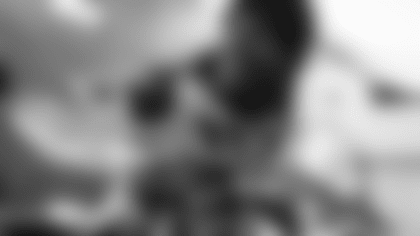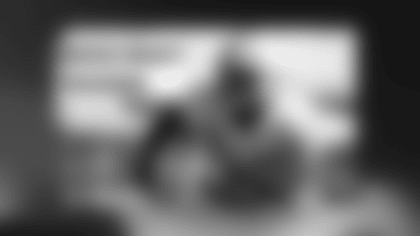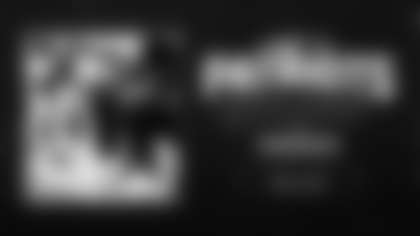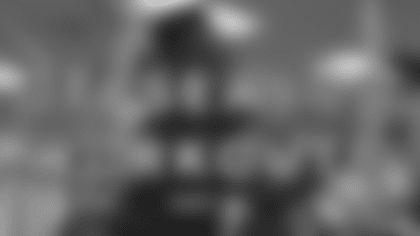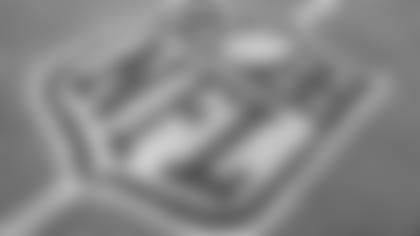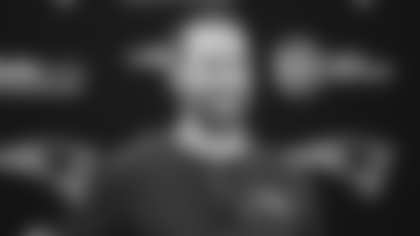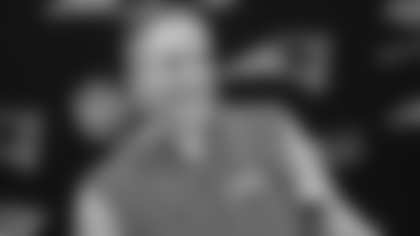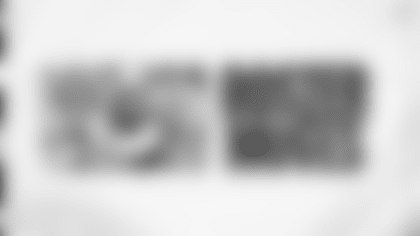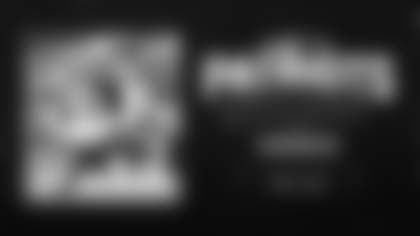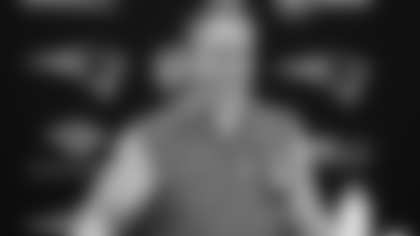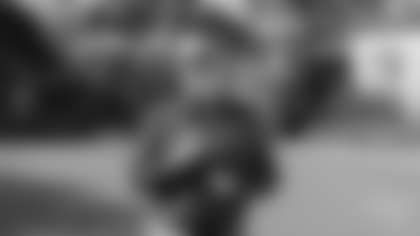New England Patriots linebacker Junior Seau addresses the media during his press conference at Gillette Stadium on January 17, 2008.
Q: A year ago you weren't able to play in this game. Can you talk about your appreciation for coming through the season healthy and being able to play in this game with this team?
JS: Last year I went surfing during the game against San Diego in the playoffs. Being in San Diego, it was actually a great time for the city of San Diego and the team, but yeah, it was definitely bittersweet for me. Being here today and to find that the situation again has [come about], to play in my hometown and a lot of the guys that I played with there in San Diego and the coaching staff that I know, it's definitely something special. I can honestly say that we're going to experience [the] AFC Championship together - not on the same team, but we'll definitely experience it together.
Q: Is it any more emotional for you, because it is the Chargers?
JS: No. You know, I try not to get too Oprah with it and know that it's just another game and know that I'm so happy for the city of San Diego, my hometown, and obviously the organization that started me off and really helped me to become who I am today. So all of that is all great, but when it comes down to playing in[between] the white lines and it comes to Sunday, it's going to definitely be a challenge. It's going to be a challenge of the game of football - nothing more.
Q: What do you remember about the AFC Championship game in '94?
JS: In '94, well, I was in my hotel room in Pittsburgh, they were filming a lot of those Super Bowl shuffles around us, yellow flags, yellow towels everywhere. We had no chance. We had no chance there, and we came out with the win. That was probably one of my fondest memories of being with San Diego.
Q: LaDainian Tomlinson said Monday you helped build the foundation of winning there. He basically credited you and said you helped teach everyone there how to be a winner. Could you talk about your legacy there and what you think you accomplished?
JS: San Diego is my hometown, number one. To start off with San Diego, with the Spanos family and everything there being in my hometown, it was definitely a treat. It was definitely a treat. Going through the grind of building that organization, helping build that organization and getting to a point where we can be effective, number one, but more importantly win in this league, and going to the Super Bowl with Coach [Bob] Ross and everything. There's so much that I can touch on, but we just don't have enough time. But I respect everything that they've done this year and I'm happy for them.
Q: In your last season in San Diego, obviously it wasn't pleasant. You lost your last four games and missed the playoffs. What was that like, to end your career there that way?
JS: To leave San Diego, it was a business move. It was time for a… Obviously Rodney [Harrison] and I left together and there was a change going on, and we knew that. You could actually feel the change come. Being there 13 years and not having a Super Bowl ring and helping that team win… In corporate America, I would have gotten fired four years ago. I kind of overstayed my stay there in San Diego, probably four years. I think that was a grace period that they gave me, and I appreciate that. So there's no hard feelings - it was just business.
Q: Is that because you felt you weren't playing to the top of your game, when you say overstayed?
JS: You know, whether you want to judge my play, whether you want to judge the morale or having the same people there lose and not making any strides forward, you have to look at that and say maybe it's time to change - and that happens everywhere. If Rodney and I were the first ones to have to move after putting so much time in in one organization, I would say that's wrong. But we're not the first. Joe Montana, Jerry Rice - you name it. Everybody had to go through it.
Q: Looking at the Chargers on tape, is there any comparison between 1994 and the team you're going to face on Sunday?
JS: There's a lot of comparisons. The major comparison is that they're confident. They've very confident in what they're doing now. What they showed last week obviously was a great game and they did it with a lot of the backups. I don't consider them backups, anyway. Those guys can play and they can start on other teams in the league. That was perseverance. That was perseverance. That showed how much depth they have on their team, but more important[ly], that showed how much character and heart is in that locker room, and you have to tip your hat off to that.
Q: In getting ready for the game, you've done it in your hometown and now you're doing it here. Is it easier without that hometown pressure? Is it harder?
JS: No, it doesn't make a difference at all - especially here. We work one day at a time. You guys have heard it before: we just want to win today, and that's in practice. That just positions us to play and execute on Sunday. So, we have a job to do today, after I'm done speaking to you, but we look forward to moving on, growing every day to the day it comes we have to go out and perform.
Q: Do you remember your first impressions of young Rodney Harrison in San Diego?
JS: Yeah, Rodney Harrison was a guy that we used as a special teams player. He used to go down there and bust up the wedge, and he had so much talent and so much tenacity that we knew there was something special there.
Q: What about his personality? Was it similar to what it is now?
JS: No, he has grown. He has grown into a man. Going through life and going through the years here in the National Football League, you love seeing a young man grow, and Rodney has grown into a man. That's one of the best blessings that I've been a part of, watching that man, Rodney Harrison, grow.
Q: You have a lot of passion for the city of San Diego. What about the San Diego Chargers song, because Coach Belichick came out this morning and said he hated it.
JS: The Super Song? It's a great song when you win. It really is. It's a great song when you win, but when we were there we heard it over and over and over again, and it's repetitive. It is that, but it's a great song when you win.
Q: When you got to the AFC Championship with the Chargers and even the Super Bowl, you said you thought it wouldn't be long before you got back there again. Has the stretch that you've been through to get back to this point given you a great appreciation for how hard that really is?
JS: This is a long journey. If you want to look at my career being a part of the National Football League, I am fortunate - very fortunate - that the New England Patriots gave me a chance. That's the best blessing that I received - being a part of the National Football League, allowing an 18-year vet an opportunity, a chance to come and perform what he believes that he can do on the field. And that's all it was. When I first came here, my decision was based on going to an organization where you have a chance. Well, this organization, the New England Patriots, they have such a culture here that all you can ask is to belong to an organization and establishment where you have a chance in life. And that goes for anyone. It doesn't matter if you're rookie or a five-year vet or an 18-year vet. In life, all you want is a chance, and that's what they gave you here.
Q: If you were to go back and look at film of yourself playing linebacker 10 years ago, what would be the biggest difference that you'd see?
JS: The biggest difference that I'd see if I watched film 10 years ago of me? Dumb, crazy, out of control. I didn't know the game. There's a point in your career where you have - you can learn the game and you know the game - you understand it. But there's a bigger difference when you can feel it. See, when you're able to feel the game, you can anticipate things, you can make calls, you can make checks, you can do things ahead of time. And that's within, like, two seconds. That's when you separate yourself from being good and being great. That's the difference.



